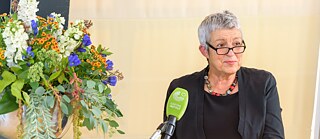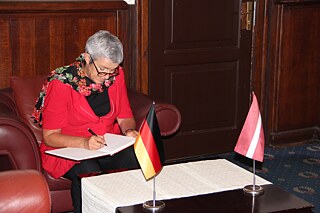Opening of the new Goethe-Institut building in Riga
European cohesion

On the occasion of the opening of the new Institute building in Riga, president of the Goethe-Institut Carola Lentz spoke about the role of European cultural policy within a complex process of foreign policy realignment.
In Riga, Lentz said that the seventieth birthday of the Goethe-Institut had provided an opportune occasion to scrutinise the Institute’s history and to ask what might be learned from it for the future of the work of the Goethe-Institut, especially in the European context. As she stressed in her opening remarks, European cohesion continues to be exposed to various challenges. “Authoritarianism, illiberalism and radical right-wing and populist groups are continuing to advance; the issues of climate protection are becoming ever more pressing; the impact of the Covid-19 pandemic is being felt among the nations of Europe with varying degrees of severity. The intensification of geopolitical conflicts such as those in Belarus and now in Afghanistan — and the associated flight of large numbers of people — are proving to be a stern test of European solidarity.“ Europe cannot afford to shut itself off in this situation, Lentz said.
